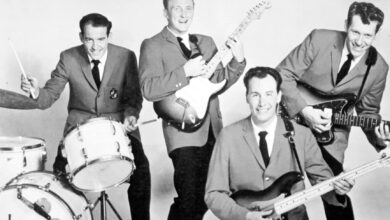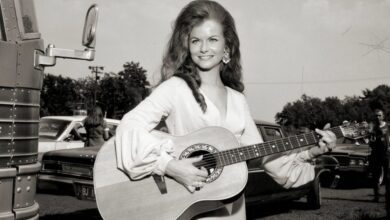Marvin Gaye’s NBA Anthem Was Iconic And Showcased His Genius To The World
Marvin Gaye’s rendition of the American National Anthem at the 1983 NBA All-Star Game remains one of the most iconic performances in music history. On that memorable evening, Gaye transformed “The Star-Spangled Banner” into a soulful masterpiece, captivating the audience with his unique interpretation. His smooth vocals and heartfelt delivery brought a fresh perspective to the anthem, leaving an indelible mark on all who witnessed it.
Born on April 2, 1939, in Washington, D.C., Marvin Pentz Gay Jr. grew up in a strict household under the watchful eye of his father, a storefront preacher. From a young age, Gaye was immersed in music, singing in his father’s church and developing a passion that would shape his future. Despite facing challenges at home, his dedication to his craft never wavered.
In the late 1950s, Gaye joined the doo-wop group The Moonglows, honing his skills and gaining valuable experience in the music industry. This period was instrumental in shaping his musical style, blending gospel, R&B, and soul influences. His time with The Moonglows laid the foundation for a solo career that would soon skyrocket.
By the 1960s, Gaye had signed with Motown Records, where he became a pivotal figure in shaping the label’s sound. Hits like “How Sweet It Is (To Be Loved by You)” and “I Heard It Through the Grapevine” showcased his versatility and ability to connect with audiences on a profound level. His collaborations with artists such as Tammi Terrell produced timeless duets that remain beloved classics.
The 1970s marked a turning point in Gaye’s career as he began to explore more socially conscious themes. His groundbreaking album “What’s Going On” delved into issues like poverty, war, and environmental concerns, reflecting the turbulent times. This shift not only highlighted his growth as an artist but also cemented his status as a voice for change.
Despite his professional success, Gaye faced personal struggles, including battles with depression and substance abuse. These challenges added depth to his music, as he channeled his experiences into his art, creating songs that resonated with authenticity and raw emotion. His ability to translate personal pain into universal themes endeared him to fans worldwide.
Tragically, on April 1, 1984, Marvin Gaye’s life was cut short when he was fatally shot by his father during a domestic dispute. The shocking incident sent ripples through the music community, leaving a void that would be felt for generations. His untimely death was a profound loss, but his legacy endures through his timeless music.
In the years following his passing, Gaye’s influence has only grown, with numerous artists citing him as an inspiration. His innovative approach to music and willingness to tackle pressing social issues set a precedent for future musicians. Tributes and covers of his work continue to introduce his genius to new audiences.
Marvin Gaye’s performance at the 1983 NBA All-Star Game remains a testament to his unparalleled talent and ability to touch the hearts of many. As we reflect on his contributions, it’s clear that his music transcends time, continuing to inspire and move listeners around the world. His artistry serves as a reminder of the power of music to unite and heal.



